God and the Pandemic Lesson 1
Mike Ervin

God and the Pandemic
Welcome Back to Class.
We are going to review a very recent book by N. T. Wright titled “God and the Pandemic”.
The Subtitle is appropriate also: “A Christian Reflection on the Coronavirus and its Aftermath”.
If you have read any of Wright’s books you might find this one unusual unusual – it is about 90 pages long. I will explain why that is shortly.
But if you read any of his books you will find I think that it is typically Wright. He always brings new insights and thinking into his writing, especially relative to interpreting biblical scripture.
I was also glad it was a short book– because as much as I enjoy studying Wright – I find all of his books to be tough to read. I will explain that as we go also.
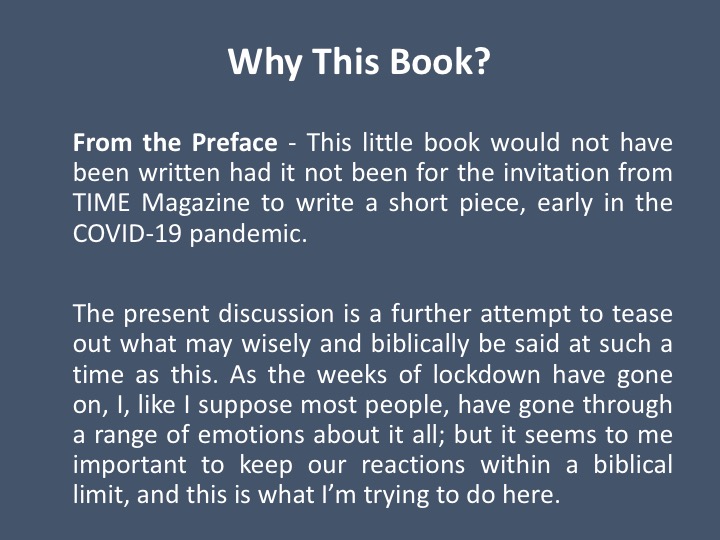
Why This Book?
So why this short book – Wright explains in the Preface of the book.
From the Preface
This little book (God and the Pandemic) would not have been written had it not been for the invitation from TIME Magazine to write a short piece, early in the COVID-19 pandemic.
And he goes on to say - The present discussion is a further attempt to tease out what may wisely and biblically be said at such a time as this. As the weeks of lockdown have gone on, I, like I suppose most people, have gone through a range of emotions about it all; but it seems to me important to keep our reactions within a biblical limit, and this is what I’m trying to do here.
And here you begin to see how he intends to go about it. He is making it clear that he is not an epidemiologist or a politician so he has decided to play to his strength and search for what wisdom he can draw from the biblical narratives about how people of faith have responded to great crises throughout biblical history.
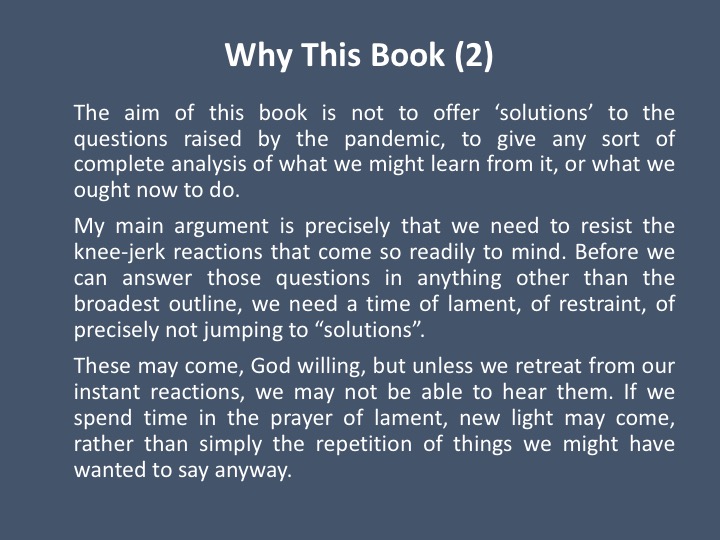
Why This Book (2)
The aim of this book (God and the Pandemic) is not to offer ‘solutions’ to the questions raised by the pandemic, to give any sort of complete analysis of what we might learn from it, or what we ought now to do.
My main argument is precisely that we need to resist the knee-jerk reactions that come so readily to mind. Before we can answer those questions in anything other than the broadest outline, we need a time of lament, of restraint, of precisely not jumping to “solutions”.
These may come, God willing, but unless we retreat from our instant reactions, we may not be able to hear them. If we spend time in the prayer of lament, new light may come, rather than simply the repetition of things we might have wanted to say anyway.
Now, even this early, we are beginning to see some of the themes that Wright ie emphasizing. Let’s talk about those.
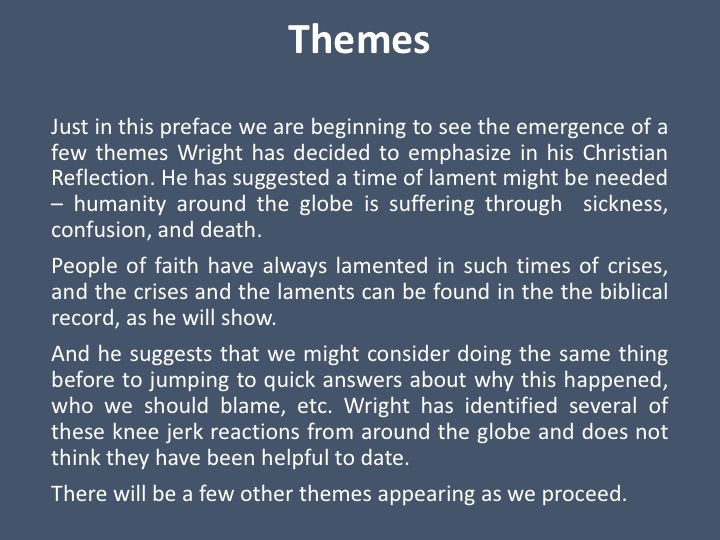
Themes
Just in this preface we are beginning to see the emergence of a few themes Wright has decided to emphasize in his Christian Reflection. He has suggested a time of lament might be needed – humanity around the globe is suffering through sickness, confusion, and death.
People of faith have always lamented in such times of crises, and the crises and the laments can be found in the the biblical record, as he will show.
And he suggests that we might consider doing the same thing before to jumping to quick answers about why this happened, who we should blame, etc. Wright has identified several of these knee jerk reactions from around the globe and does not think they have been helpful to date.
There will be a few other themes appearing as we proceed.
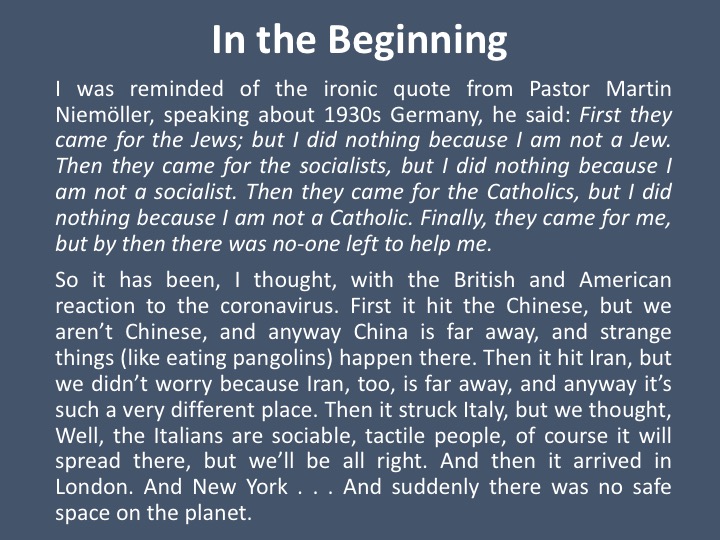
In the Beginning
And Wright also suggests that we may not have been alert to the treat as we should have been. He offers the following example from Nazi Germany.
I was reminded of the ironic quote from Pastor Martin Niemöller, speaking about 1930s Germany, he said: First they came for the Jews; but I did nothing because I am not a Jew. Then they came for the socialists, but I did nothing because I am not a socialist. Then they came for the Catholics, but I did nothing because I am not a Catholic. Finally, they came for me, but by then there was no-one left to help me.
So it has been, I thought, with the British and American reaction to the coronavirus. First it hit the Chinese, but we aren’t Chinese, and anyway China is far away, and strange things (like eating pangolins) happen there. Then it hit Iran, but we didn’t worry because Iran, too, is far away, and anyway it’s such a very different place. Then it struck Italy, but we thought, Well, the Italians are sociable, tactile people, of course it will spread there, but we’ll be all right. And then it arrived in London. And New York . . . And suddenly there was no safe space on the planet.
So what is going on?
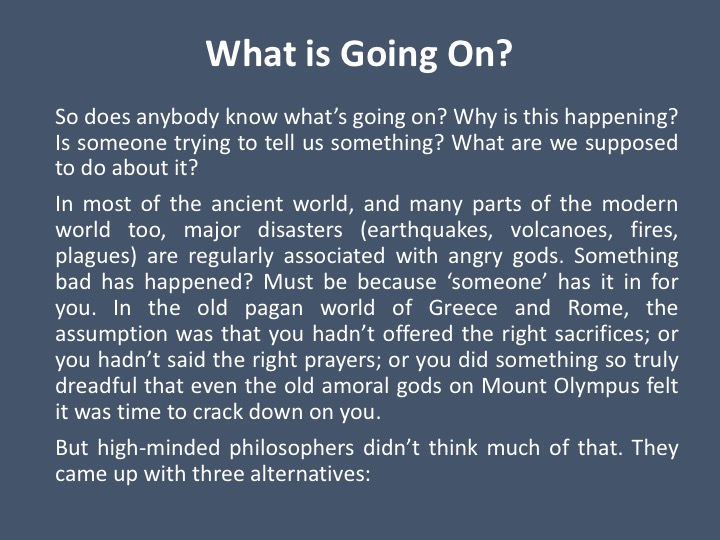
What is Going On?
So does anybody know what’s going on? Why is this happening? Is someone trying to tell us something? What are we supposed to do about it?
In most of the ancient world, and many parts of the modern world too, major disasters (earthquakes, volcanoes, fires, plagues) are regularly associated with angry gods. Something bad has happened? Must be because ‘someone’ has it in for you. In the old pagan world of Greece and Rome, the assumption was that you hadn’t offered the right sacrifices; or you hadn’t said the right prayers; or you did something so truly dreadful that even the old amoral gods on Mount Olympus felt it was time to crack down on you.
But high-minded philosophers of the ancient world didn’t think much of that. They came up with three alternatives:
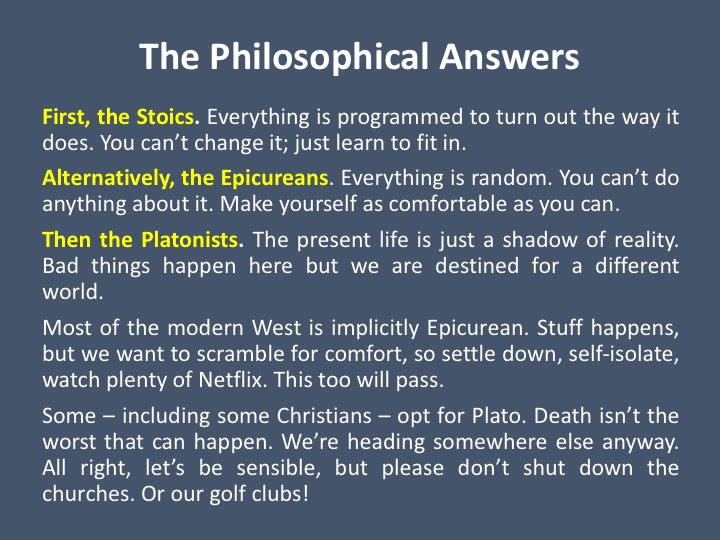
The Philosophical Answers
First, the Stoics. Everything is programmed to turn out the way it does. You can’t change it; just learn to fit in.
Alternatively, the Epicureans. It is not programmed. Everything is random. Stuff happens. You still can’t do anything about it. Make yourself as comfortable as you can.
Then the Platonists. The present life is just a shadow of reality. Bad things happen here but we are destined for a different world.
To Wright, most of the modern West is implicitly Epicurean. Stuff happens, but we want to scramble for comfort, so settle down, self-isolate, watch plenty of Netflix. This too will pass.
Some – including some Christians – opt for Plato. Death isn’t the worst that can happen. We’re heading somewhere else anyway. All right, let’s be sensible, but please don’t shut down the churches. Or our golf clubs!
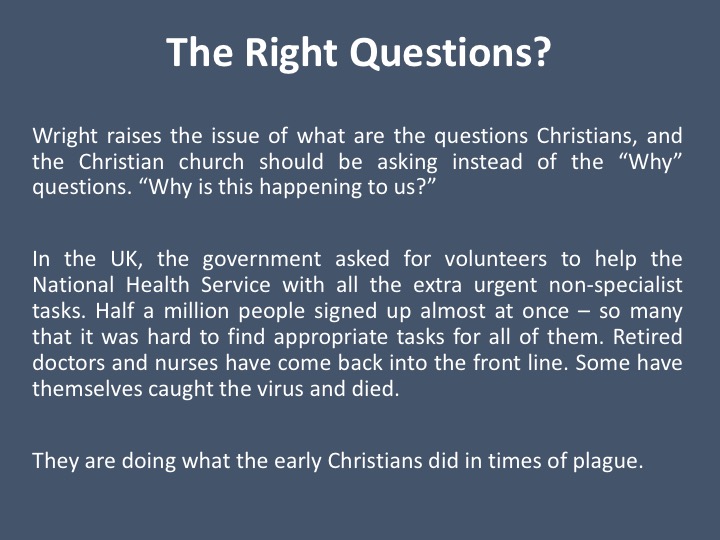
The Right Questions?
Wright raises the issue of what are the questions Christians, and the Christian church should be asking instead of the “Why” questions. “Why is this happening to us?”
In the UK, the government asked for volunteers to help the National Health Service with all the extra urgent non-specialist tasks. Half a million people signed up almost at once – so many that it was hard to find appropriate tasks for all of them. Retired doctors and nurses have come back into the front line. Some have themselves caught the virus and died.
They are doing what the early Christians did in times of plague.
And Wright backs that up with some scholarly research.
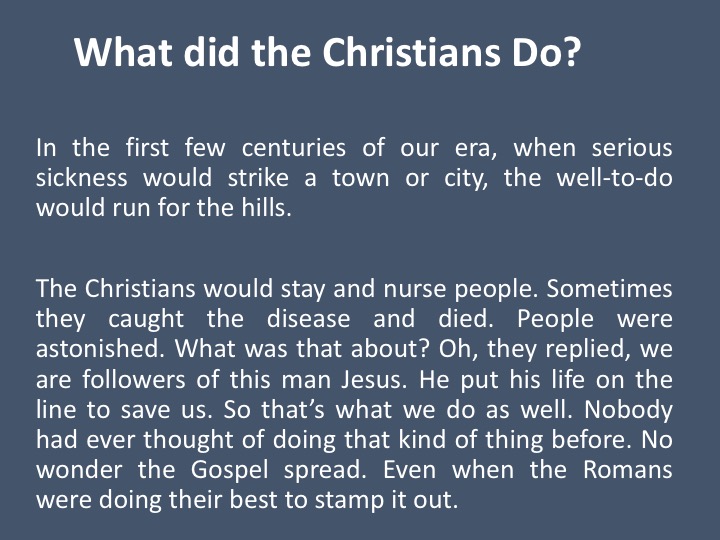
What did the Christians Do?
In the first few centuries of our era, when serious sickness would strike a town or city, the well-to-do would run for the hills.
The Christians would stay and nurse people. Sometimes they caught the disease and died. People were astonished. What was that about? Oh, they replied, we are followers of this man Jesus. He put his life on the line to save us. So that’s what we do as well. Nobody had ever thought of doing that kind of thing before. No wonder the Gospel spread. Even when the Romans were doing their best to stamp it out.
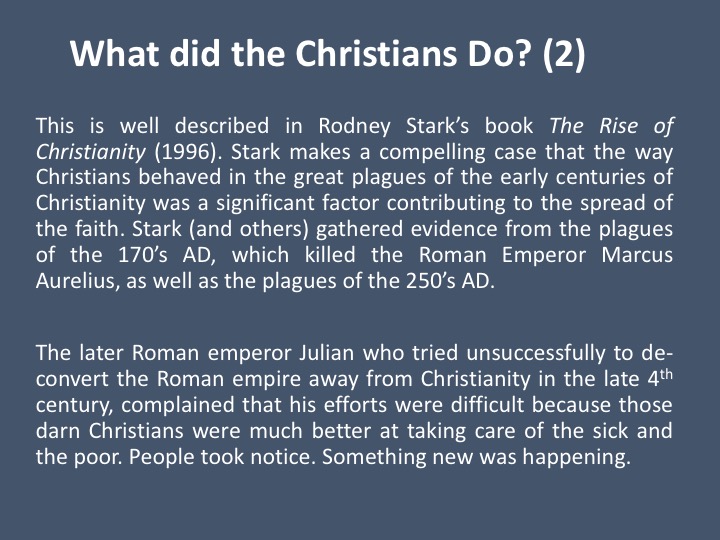
What did the Christians Do? (2)
This is well described in Rodney Stark’s book The Rise of Christianity (1996). Stark makes a compelling case that the way Christians behaved in the great plagues of the early centuries of Christianity was a significant factor contributing to the spread of the faith. Stark (and others) gathered evidence from the plagues of the 170’s AD, which killed the Roman Emperor Marcus Aurelius, who did not get out of town quickly enough, as well as the plagues of the 250’s AD.
The later Roman emperor Julian who tried unsuccessfully to de-convert the Roman empire away from Christianity in the late 4th century, complained that his efforts were difficult because those Christians were much better at taking care of the sick and the poor. People took notice. Something new was happening.
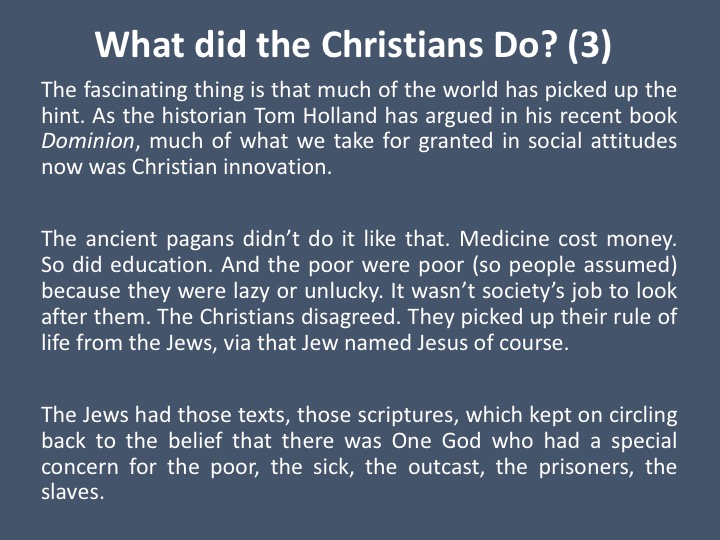
What did the Christians Do? (3)
The fascinating thing is that much of the world has picked up the hint. As the historian Tom Holland has argued in his recent book Dominion, much of what we take for granted in social attitudes now was Christian innovation.
The ancient pagans didn’t do it like that. Medicine cost money. So did education. And the poor were poor (so people assumed) because they were lazy or unlucky. It wasn’t society’s job to look after them. The Christians disagreed. They picked up their rule of life from the Jews, via that Jew named Jesus of course.
The Jews had those texts, those scriptures, which kept on circling back to the belief that there was One God who had a special concern for the poor, the sick, the outcast, the prisoners, the slaves.
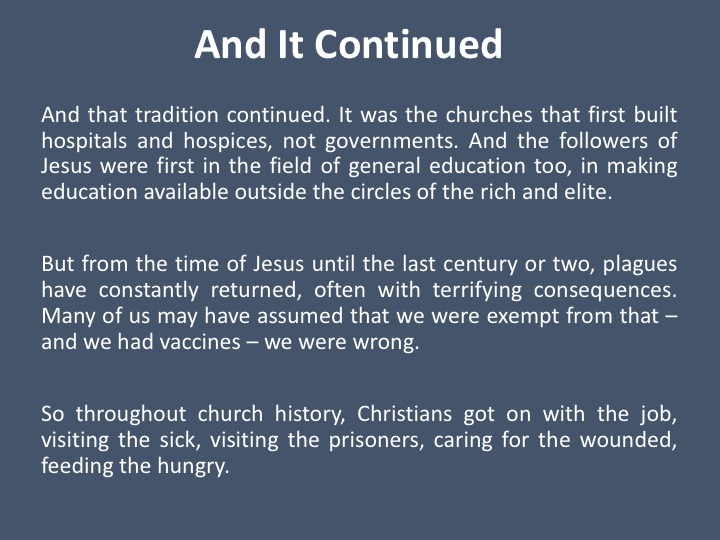
And It Continued
And that tradition continued. It was the churches that first built hospitals and hospices, not governments. And the followers of Jesus were first in the field of general education too, in making education available outside the circles of the rich and elite.
But from the time of Jesus until the last century or two, plagues have constantly returned, often with terrifying consequences. Many of us may have assumed that we were exempt from that – and we had vaccines – we were wrong.
So throughout church history, Christians got on with the job, visiting the sick, visiting the prisoners, caring for the wounded, feeding the hungry.

Luther’s Letter of Spiritual Counsel
This characteristic of the Christians was still in play 13 centuries later during the Reformation.
Martin Luther faced several deadly plagues in the 1520’s and again in the 1530’s, and in his letters to both church and civic leaders he insisted that preachers and pastors should remain at their posts: as good shepherds they should remain at their posts.
And likewise civic and family leaders should only flee from a plague if they have first made proper provision for the safety of those left behind.
An we have the letter he wrote to preachers and pastors in 1527 on the next slide.

Luther’s Letter of Spiritual Counsel (2)
Luther wrote in 1527:
“With God’s permission the enemy has sent poison and deadly dung among us, and so I will pray to God that he may be gracious and preserve us. Then I will fumigate to purify the air, give and take medicine, and avoid places and persons where I am not needed in order that I may not abuse myself and that through me others may not be infected and inflamed with the result that I become the cause of their death through my negligence. If God wishes to take me, he will be able to find me. At least I have done what he gave me to do and am responsible neither for my own death nor the death of others. But if my neighbor needs me, I shall avoid neither person nor place but feel free to visit and help him.

So What Has Our Modern Christian Response Been?
According to Wright – the response has been disappointing to date.
Some are simply wringing their hands and asking the “WHY? questions.
Some are simply playing the blame game – its China’s fault.
Some just say God is trying to send us a message.
Some are eagerly saying that this is the sign of the End Times.
Some are saying this is our chance to tell everyone about Jesus and heaven. Maybe this time they will listen.
Some are saying God did this because he is angry with us for some reason.

What Are Some Better Questions?
But Wright has his own thoughts about better questions – the kind the early Christians asked:
1. Who is being harmed by the latest crisis?
2. What can we as agents of God do to help?
3. Who do we send?
And this notion that we are agents of God is another common theme of Wright’s. What a lot of Christians seem to think is that saying God is sovereign means that God is so all powerful that he does everything when Wright has argued that the scriptures are indicating that in the Kingdom of God that God’s image bearers (people of faith, disciples) are the agents that God expects to take care of business on earth for God.

So Where Do We Begin?
Wright has already said that wants to bring a biblical perspective to these questions and his suggestion is to begin with the Old Testament because that is where some of the apparently key texts can be found that might supply some answers. He will then progress to the Gospels and the remaining parts of the New Testament.
One of the consistent aspects of Wright’s writings is that he maintains that most Christians, though they may have multiple bibles in their homes, do not read them the way they should be read – often using them for proof texts to justify some of their predetermined beliefs. Wright strongly suggests that we learn the wisdom of the bible by reading the books not only frequently but completely, because they are narratives and can teach us the entire combined story (O.T. & N.T.) of humanity's relationship to God.

Were They Great Disasters in the Hebrew Bible?
That is of course a rhetorical question!
In the Hebrew scriptures, the greatest disaster of all was the Babylonian exile.
To understand the magnitude of what happened to this relatively small Kingdom requires a deep understanding of what happened over an extended period of time. An understanding that most people of faith do not get from their relatively cursory manner of studying the biblical record.

A Very Brief Review - Israelite History (2)
The Pre-Monarchic Period (1400 -1020 BCE)
The patriarchs Abraham, Isaac, and Jacob
Egypt – Joseph, slavery, Moses, the Exodus
Joshua and the entrance to the promised land
Judges – the gradual transition of the tribes into a nation
The Monarchic Period
Israel moves to a monarchy c. 1020 BCE with Saul (1020-1000 BCE)
The united monarchy, David and Solomon (1000 – 930 BCE)
The divided kingdoms:
Israel in the north – 9 tribes – (930 – 721 BCE) 209 years
Judah in the south – 3 tribes – (930 – 586 BCE) 344 years
The division was caused by political differences, and the two Kingdoms never got along after that.

A Very Brief Review - Israelite History (2)
The southern Kingdom of Judah by contrast survived for 344 years after the formation of the divided monarchies. During that entire period the family of David and Solomon ruled it.
The northern kingdom never did have a consistent royal family like the family of the Davidic Kings. It did have a formal capital in the city of Samaria.
In the year 721 B.C.E., Assyria destroyed the northern kingdom of Israel, including its capital city of Samaria, and exiled the population to Mesopotamia to work in Assyria and surrounding regions.
This effectively ended the northern Kingdom of Israel and we never hear from it again in the Biblical narrative. Fortunately for Judah the Assyrians apparently had enough problems of their own, possibly back home, that they did not attempt to conquer Judah and the walled city of Jerusalem. They did threaten enough that they received an annual tribute from the King to leave them alone.
In ancient time with fortified and walled cities the principal strategy for attacking a city was siege and possible starvation. The fall of Samaria (Northern Kingdom) required a 3-4 year siege.

Two Stages of the Assyrian Empire.
To give you a better understanding a map is useful. The smaller pink encircled territory represents the Assyrian Empire under King Shalmaneser III from 858-824 BCE. It had not extended to the areas of the Northern and Southern Kingdoms (Israel and Judah).
But by 668-627 BCE the Empire had expanded greatly and extended deep into Egypt.
As mentioned earlier in 721 BCE the Northern capital (Samaria) was destroyed, but Judah was still intact and survived all the way to 586 BCE when Babylonian Empire overran the Assyrian Empire and captured and destroyed Jerusalem and the temple, with heavy loss of life.
We will not review a map of the Babylon Empire as it only lasted about 48 years after the destruction of Jerusalem.
The next map is of the Persian Empire, which conquered the Babylon Empire.

The Persian Empire
The Persian Empire was huge. As discussed earlier the area surrounding Jerusalem was now a tiny and poor province of the Persian Empire called Yehud, a shadow of its former glory. Judah no longer existed.

A Very Brief Review - Israelite History (3)
Finally, there is the Post – Monarchic period. It can be divided into three distinct periods.
1. The Babylonian Exile (586-538 BCE resulted from the Babylonian destruction of Jerusalem and the deportation of the people to Mesopotamia.
2. The Persian period (538-333 BCE) commenced with the Persian conquest of the Babylonians and the decree by their king, Cyrus the Great, to allow the Jews to return to Jerusalem and rebuild the Temple, which was dedicated in the city of Jerusalem in the year 516 BCE.
3. The conquest of Alexander the Great (333 B.C.E.) was a major turning point. The period that follows is called either late antiquity or sometimes the Greco Roman world.

Bad Times
There were substantial differences between the monarchic and the post monarchic periods.
Judah was a relatively prosperous kingdom during the late monarchic period (the last decades before the destruction of the Temple in 586). Jerusalem was at the time an important city whose population (about 25,000 people) was about a third of that of the kingdom as a whole (about 75,000).
Post monarchic Judah, the Persian province of Yehud, was much smaller and poorer. For instance, the population of Jerusalem in the second half of the Persian period (450–332) was likely around 1,500 inhabitants. Likewise, the province of Yehud after the restoration, which began in 538 reached a population peak of probably only 17,000.

Bad Times (2)
The once independent Davidic kingdom has become a relatively small and peripheral province in a large empire. Moreover, the fall of Jerusalem and Judah in 586 had more than just political, demographic, and economic impact.
From an insider’s religious perspective, when the monarchic period came to a close:
Jerusalem (= the Lord ’s city),
the Temple (= the Lord ’s house), and
the Davidic dynasty (= the Lord ’s chosen dynasty) all fell.
There is no doubt that the events of 586 represent a watershed in the history of Judah and ancient Israel, and were understood as such by those who lived after these events. Postmonarchic Judahites attempted to understand them in terms of divine justice and tried to understand themselves within a world in which their community, from their perspective the Lord ’s people, was so powerless compared to other nations and compared to their memory of monarchic Judah. These issues loomed large in the post monarchic communities within which the prophetic books were written or reached their present form, and certainly were of great concern to the people for whom they were written. Reflections on these issues are evident in many of the prophetic books, and assume two forms: condemnations of monarchic Judah for sins so great that they justified the Lord’s destruction of Jerusalem, and messages of hope and restoration that reassured the post monarchic community that their present situation was not the “end of the road” but only a minor stop in a journey that led to an ideal and glorious future for Israel—and at times, for the nations too.

Next Week
And so where is Wright going with this? What might we learn about how to respond to our pandemic?
As mentioned, before he said he would like to focus on biblical insight because a great deal of Old Testament literature was composed during these really “bad times”. What did that scripture reveal about their difficulties? And their response?
A significant part of Old Testament scripture was written in those really bad times, including quite a bit of the Psalms, the Book of Lamentations, Daniel and others. We will review some of that material and even take a dive into Job before eventual moving over to the Gospels and the remainder of the New Testament. Then wrap up with some of his thoughts on what the Christian response might be to the Pandemic.